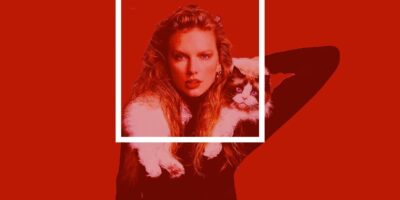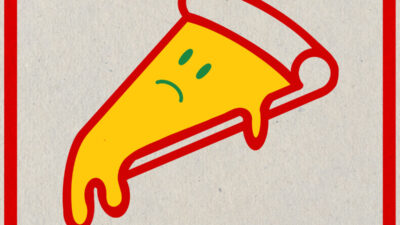As a teenager with an all encompassing passion for indie rock and pretty much no understanding about how the music industry actually worked, the record labels I obsessed over just always seemed like dope brands. Going to shows and hanging out with people in my hometown’s music scene, I was always able to gauge how cool someone was by the record label merch they repped. Topshelf Records was one of the elusive labels that just oozed cred. To this day, if I see someone rocking a Topshelf shirt I’m immediately intimidated by them and also immediately really want to be their friend. I had the pleasure of chatting with Topshelf’s publicist, William Osiecki, to hear about his process handling press for one of rock’s best record labels, Topshelf’s seriously gorgeous website redesign, and some of the label’s releases from this year that have excited us both.
How did you get involved with Topshelf and were you working in the industry before you got involved with Topshelf?
William Osiecki: So, I actually got involved with Topshelf through David, the bassist of Gulfer, because he and I were running a small, mostly tape label in Montreal between 2012 and 2018, and at one point we did a tape release with Topshelf for this chiptune-y emo band called (T-T)B. That’s how I got formally introduced to the label. They put up a job posting when I moved back to the states in 2018 and I was coincidentally free and looking for a job and I applied and I got lucky with timing.
Why were you in Montreal? Are you from there?
WO: It’s kind of a complicated story. I’m from Atlanta, but I moved to Montreal when I was a kid with my parents. That’s when I met David. And then I eventually moved back to Atlanta to finish high school and then I went back to Montreal for university. I did one more stay in Atlanta after that but then stayed in Montreal for a few more years. It’s pretty much my second home. I live in Seattle now.
Having lived in the South, French Canada, and the Pacific Northwest, being involved with a Pacific Northwest label, how do you think being based in the Northwest impacts your relationship to music and the music you release?
WO: Kevin (Duquette) only ended up in Portland around the same time I ended up in Seattle. I wouldn’t say there’s been too much of a Pacific Northwest influence, just because it’s such a new home for the label, I think. We have other people on our staff who live on the East Coast, and of course the pandemic has changed everything because it’s not like we’re embedded in the scene because there is no scene right now. It hasn’t figured much into what we’re doing lately, actually.
A lot of labels that I talk to for this series are helmed by one person, but it seems like Topshelf is a pretty large operation with a lot of moving parts. I’m curious what a day at Topshelf looks like. Do you have an office? Do you work independently? What would you say a normal day at the label entails?
WO: We’re four-to-five people. It kind of changes depending on different factors. Seth who founded the label with Kevin is not always around, but he handles contracts and licensing and digital stuff. I work with him to set up digital things. We have two other people on staff, Mack and Sarah who handle everything from the store to socials to content; most of the front-facing stuff. I handle mostly PR, but a little bit of everything. We’re a small group so we have a lot of overlap, but we do work independently sometimes. It’s basically Slack and email is what it comes down to with occasional Google Hangs to see each other and socialize a bit. It’s pretty fluid, I would say.
Stuff pops up that you weren’t expecting. Maybe a band wants to change their gameplan up and you have to go with that and make changes on the fly and just be ready for something unexpected to happen. A band that you have a strong working relationship with will come to you with great music you weren’t expecting, and then we put the day on pause and figure out how we’re going to accommodate it. Oftentimes it’s, like, “This is going to have to wait until tomorrow.” I try to keep a consistent schedule. I’m 9-5, but that helps me to be fluid and flexible with whatever comes up on a given day.
So Topshelf is your full-time job?
WO: Yeah.
Nice. A lot of people I talk to for this series do their labels as a hobby.
WO: That’s what I was doing before Topshelf. I never made any money doing it before I got this job. It’s hard to find a paying job in the music industry, straight up. Especially now. I was taking random sound design gigs before I found this.
So what are your favorite Topshelf releases? What’s your favorite album the label put out before you came on the team, and what are your favorite records you’ve been involved with putting out?
WO: I couldn’t narrow it down to one. There’s also specific eras and some grey area. Are we counting reissues?
We can count reissues.
WO: When I was younger math rock was all I cared about, which I’ve grown out of. I’ll go back to the toe records all the time. I love toe. The first Topshelf affiliated release I knew of was Rooftops’ A FOREST OF POLARITY, which is a wacky math rock record. I’d say pre-my involvement with the label, it’s probably any math rock record the label did.
As far as the last two-ish-plus years that I’ve been at the label, it’s hard to say. There’s some where I was, like, definitely pushing for the label to sign it or having more input in what we’re doing and who we’re working with. In terms of super recent stuff, the Flung record, which I’m pretty sure you reviewed at The Alt.
That album fucking rocks.
WO: That was a super exciting record to get kind of out of the blue. I don’t think it was actually finished when we got it, but we were all drawn to it. It’s emblematic of what we’re all into: music that doesn’t stay in one place. There’s a lot of crossover and I don’t want to say the word innovative because there’s, you know, big tech implications, but I feel like that’s what a lot of music we like is doing. Just, like, fucking up formulas and cross-pollinating different styles. That’s what excites me. I don’t want to speak for everyone else completely, but that’s a common thread throughout a lot of what we’re doing right now.
Yeah, that record is truly, on all levels, insane, but also super listenable. I got the advance and I was just, like, “This doesn’t really sound like other music released in the past three years, but it also isn’t abrasive in doing that at all.” I don’t know. My words on the record are on the internet, but that’s probably one of my favorite Topshelf records to date.
WO: Hell yeah. I’m super glad to hear that. I feel like I would have liked more time to work on it from a PR side. That’s a typical publicist thing to say, so probably not very insightful, but I would have loved to get it in the hands of more than just the indie rock-sphere-umbrella-world.
But yeah, other records. I sincerely love everything we put out. And we’re kind of getting to a place where we more-or-less all agree on something before we sign a band or an artist. We’re always working on something because we love it. I would definitely say the Gulfer record just because I was with those guys from day one. Watching them put out something that’s super well produced, super well received, super catchy, but also just bangin’ that puts different styles together and makes it work. I just think that record is fucking sick.
I really liked the Bellows record that we put out in 2019. That was another example of crossing so many styles and creating its own language or its own genre, which I love. I’m super about that.
That’s a record I haven’t actually heard yet, but I will give it a spin.
WO: I think there’s definitely that meshed weird, like, organic electronic crossover. I would say it’s maybe more polished than Flung, but you’re always, like, “Woah this weird electronic stuff came out of nowhere.” But it always meshes so perfectly into the mix.
Back to the Flung record for a second. That’s a split release between Topshelf and Citrus City. I’m curious how a split between a “bigger label” with multiple people running it and a one-person label goes down. What was your role in the process vs. Manny’s role in the process.
WO: We do that a lot, but it kind of changes based on who we’re working with, like, the artist and also the label. With Manny I was just, like, “Let’s just work to our individual strengths.” It was also kind of a tight time window, and being, like, “What can we do to make the most impact here?” I mean, my first answer to that is always “What are your strengths? What are my strengths? What are my weaknesses? Can you do better where I’m, like, lacking?” We’ve done some releases with Babe City as well.
Love Babe City over here at Merry-Go-Round!
WO: Love Citrus City and Babe City, straight up. I just want to say that. But yeah, it’s like doing anything in the art world. Ask for help wherever you need it. There’s usually someone who can help out. It’s just a matter of identifying your strengths and your weaknesses. I mean, for example, I feel like my strengths are more setting up interviews and long lead stuff and I kind of find it harder to get singles out into the world and get buzz around that stuff. I try to identify that with whoever we’re working with up front to see if they have something that can offset that.
You mentioned eras of Topshelf and I’m curious how you would break down those eras of the label.
WO: I definitely don’t want to speak for the label. I feel like Kevin would have a very different perspective on this than I would for obvious reasons, but I think it’s best broken down by where they physically were at different times. It started in Western Mass, I think when Kevin and Seth were in their early 20s. They eventually relocated to Boston for a while and then to San Diego where there was an office. We don’t have an office anymore, but that was right before I came into the picture. I think when I got hired they were closing up the San Diego office. Geographically is the best way to break it down into the little eras. That’s when team changes happened and the team we have now has been in place for about a year with one recent addition. There’s a few moving parts.
I didn’t realize Topshelf had moved around as much as it has because it’s very much branded as the “Portland Label.”
WO: Portland is great. I think that’s just because people associated Kevin with the label. He’s very much been the voice and face of the label for a while, but I’ve only been to Portland once.
So, you’ve had a lot of great releases this year, but the other interesting thing following Topshelf this year has been the website redesign and seeing how excited pretty much everybody on indie rock Twitter was about that. It seems like Kevin had a lot to do with that, but I’m just curious if you were involved, what led up to that, how it’s changed things for the label, and some of your favorite parts of the new website, which is admittedly a very, very cool website.
WO: Well first, thank you for the kind words about the website. Just so much work and collaboration went into it. It was definitely mostly Kevin leading pretty much everything, but the most recent addition to our staff, Sarah, they helped a lot with addressing little bugs here and there. They’re pretty much the only other person on the team who’s a capable coder. They were immensely helpful for Kevin. It was just a lot of trial and error, honestly. I think Kevin worked on it for two-and-a-half years or something, so it was definitely taking up a lot of our collective time. We just wanted to set something up for ourselves that gave us more flexibility with what we’re doing. We started getting to know features and studio tours and stuff that bands have in their head already with the photos already taken. We put that together and gave people an inside glance when we could, and just the way that the website is set up now makes that super easy. In terms of branding, it’s a whole new look. I really like it. It’s a new chapter in a front facing sense.
Yeah, I mean with a label I feel like branding is everything, marketing, yada yada, but, like, with that website you’ve definitely branded yourselves… it looks so good. It’s one of the best websites in indie rock.
WO: What I really like about it is it’s so organized and everything is properly tagged, so it’s easy to search and get lost in the history of the label. If you want to search by year or genre or what have you, that’s just right there for you to play around with and get lost in. That kind of thing is just super lost. Using Spotify where there’s no context for anything, it’s just a completely… I don’t want to say hollow experience, because you’re still there enjoying music, but there’s a complete context collapse. There’s no credits or release information. It’s just, “Here’s something for you to consume.” We’re very much about actively engaging with what we’re doing. I think the website allows for that, and that’s one thing I really love about it.
Yeah, definitely. So as a publicist, at what stage in the game do you start working a record to various outlets. What does your process publicizing Topshelf releases entail?
WO: In terms of the timing, it’s always different. In the pre-COVID world stuff was prioritized if the band was going on tour, and if the tour was a long one you probably had more lead time because it’s probably around a record release. It was a bit more regimented. Once the pandemic struck, we had a bunch of stuff in place that was scheduled around tours, but once touring just became not a reality at all, that’s when we started doing stuff on a little shorter notice. When an artist comes to you and they’re really excited about something, you don’t want to be, like, “Okay sit on this for six months.” So it’s just a negotiation with how long you are willing to sit on this, and sometimes we just can’t do something if we want to have bandwidth. At any given moment I’m working on several records, like, several campaigns. I can’t immediately drop everything and start working on this sick album we just signed. So it’s just super dependent on what’s already going on at that time.
My general process with an album is that I have an idea of a few writers who will be into it. Like, Gulfer, I just knew who the fans were already. It helps when there’s past press because you can just go to who wrote about it and work from there, which is what I did with Gulfer. It’s just about, like, knowing who’s listening to what, who’s going to be receptive, who’s going to care. I’m not trying to spam people who aren’t receptive to emo. That’s just a waste of both our time. I think it’s just about knowing who’s into what, and that’s a lot of hanging out on Twitter and lurking in conversations. Like, “Oh they like Joyce Manor, maybe they’ll dig Gulfer.” That’s a lot of it, honestly. Sending out a press release and just seeing who gets back to you. Like, “Oh I opened this and it was sick and I’d never heard of that before,” and developing relationships from there. I think a lot of being a publicist is being a music fan and following the threads and seeing who’s into what. That’s always been something I’m into, just checking out what people are talking about. Not music journalism per say, but just what are artists listening to? What are my friends listening to?
Yeah, I feel like, being on the receiving end of Topshelf pitches, they definitely feel a bit more personable than the average one of the, like, hundred pitches I get a day.
WO: I can’t imagine what that’s like. That seems so overwhelming.
I mean honestly, it’s definitely just a lot of knowing who I want to accept pitches from. If it’s Citrus City I know I’m going to write about it because I love that label. Or if it’s, like, “Woah what that fuck? Topshelf pitched me?!?” I wouldn’t believe that if I was 18 years old. Jamie at No Earbuds is also very good at giving music press a personal touch… It’s just kind of knowing who I want to get pitches from, and then kind of the random ones, unless I’m in a really open mood, they kind of just sit unopened unfortunately. Just too many emails. The Topshelf pitches, and Topshelf in general, just have more of a, like, true music nerdy personable feel that makes it one of the more exciting labels to work with on the writing side of things.
WO: Sick! I mean, as a publicist that’s a great thing to hear.
I definitely mean that as a huge compliment, for sure.
WO: I relate to that sentiment though. When so much is coming at you, you’re more receptive to the stuff you’re already into. That seems obvious to say, but we get a lot of great submissions in our inbox, and I acknowledge that they’re great, but I’m often not in the right headspace to engage with it. When someone’s, like, “Yo, check out this band it’s so sick,” and they just keep pressing you to check it out, it’s just, like, “I’m not there right now. I’d probably like this, but another time.” Like a lot of things, it just comes down to timing. I totally relate to leaving a couple things on read in the inbox.
Before I was doing the writing thing, and still, I was a musician and it’s so hard to get label peoples’ attention. I feel like suddenly I’m on the other side of being pitched stuff and it’s, like, “Woah this is what it’s like? I got sent a hundred records today!”
WO: I relate to that experience. I am also a musician on the side, so I also relate to that strongly.
How do you balance being a musician and working in the industry? Do you find they work together? Do they work separately?
WO: Well lately it’s been really interesting because my main project is this sort of electronic thing with David from Gulfer. He lives in Montreal, I live in Seattle. We’re doing everything online, which is difficult. So much of playing music together is feel and mood and that shared collaborative experience.
Oh yeah. I get that.
WO: It’s hard to cultivate that online. So honestly I think that’s the hardest negotiation in the whole thing. I don’t think Topshelf gets in the way, except we did put out a track the same day as a Gulfer track. People are going to check out the Gulfer track. That’s what I want.
I’m also kind of resigned to doing my thing and making what I like and not really chasing numbers or clout or any of that. We don’t have a Facebook page. We have Twitter and that’s it. I don’t think we use it at all really. I do find myself being, like, “Okay I’ve thought about music too much today. I can’t work on music tonight.” Like, I want to open Ableton and I do and I’m burnt out. It’s really just, like, doing it when I feel the call, which sounds so wack but that’s the most fulfilling way for me to do it, honestly. It’s been great!
What’s the name of your project?
WO: It’s called Bas Relief. We made the mistake of choosing a French expression and no one knows how to pronounce it. But we make, like, electronic stuff with lots of guitar. We were super into sampling, but I’m trying to make music without sampling other peoples’ work right now. That’s what’s keeping me interested and motivated to do it.
So I’m going to ask the dreaded COVID question, but how has the pandemic impacted your work as a publicist? Are there any positive or negative impacts it’s had?
WO: Oddly, I feel like I hit a stride during COVID, which makes no sense. It’s tragic how many people were laid off, how many writer jobs went poof in a matter of weeks. It was scary to watch, as I’m sure you know. There was definitely a period where there were so many staff shuffles and changes that I couldn’t get anyone to open anything or listen to anything. I think once the dust settled a bit, people were almost more eager to take a shot on new things. Especially with the uprisings over the summer, I think people were willing to be more open-minded and not close themselves off to what they thought they were into. Which is kind of funny because we were talking about sticking with what you know for the most part. I find people were going against that grain, and I hit a stride, honestly, with people taking a shot on new stuff we were doing with mostly unheard of artists. It’s a mixed bag for sure.
It’s hard to stay motivated. Some days it’s, like, “Is what I’m doing even worth shit,” but I just keep going because I love music and I love the artists that we work with. That’s what keeps me going. Because I’m a musician, if I don’t kill it on a campaign I definitely take that to heart because I want that success for that artist. Yeah, COVID has definitely amplified that a bit because I have this huge, awful thing to point to, but it’s also just, like, this is what we need for artists without touring. Touring was probably the best PR tool that bands had, so at least it feels like it’s more on the publicist’s shoulders right now to get bands out there and help with promo.
Yeah, definitely. I think you’re onto something. I feel like you’re more receptive when you have nothing but time on your hands. I don’t know about you, but I’ve been listening to, like, hours of music. Even more so than I ever have before because, like, what else are you going to go do?
WO: Yeah, absolutely. There’s no shows, you know! That was such a good way to find new music.
Now it’s like you actually have to check out the records that you’re hearing about or that are getting sent your way. I think it is, in a weird way, a golden age for trying to get people excited about new art.
WO: Oddly, yeah. One record I was really surprised that did well for us this year was Thanya Iyer’s album, who is another artist from Montreal that I knew before working with the label, which might have helped with what I do. I feel like it’s one of those campaigns where it had the snowball effect and people are still talking about it. It’s a great record, but it’s one of those more challenging listens. You might not click with it immediately when you put it on, but there’s a whole world in that album that I think if you actively engage with it you’re going to be, like, “Wow this is such a gem.” I think that happened just because people had time to check it out. That’s what I’m chalking it up to. It’s hard to pinpoint the exact reason.
Yeah, that album is so good though. Even though it’s challenging and experimental, it does what, like, maybe Honey Oat does, or, like, Flung as a derivative of that, where it uses really pretty, jazzy instrumentation to still convey experimental tendencies. Because of that it’s not, like, “Oh my god this is so experimental,” it’s, like, “This is intriguing and fascinating.” That’s definitely another one of my favorite records of 2020.
WO: I love to hear that. I mean, that’s such a wonderfully deep record. It’s not, like, angular free jazz, but it still has the improvisation. There’s cool modern elements. I’m in love with it.
That might be another one we see on my Top 20 of 2020. I have to give it a couple more spins, but I can’t imagine I wouldn’t like it more after loving it the first few times.
WO: I’ve listened to it a whole bunch. When I’m working on an album, I listen to it on repeat. It’s one of those where every time I go back there’s something new.
Yeah, totally. I checked out that record about a week after it got press everywhere, and I’m kind of mad I didn’t listen to it sooner and write about it. Honestly, another one of my all time favorite Topshelf releases.
What are some of the most gratifying parts of being a publicist for an indie label and what are some of the more challenging elements?
WO: Gratifying is just getting the big hits obviously. I love when there’s a review… for example your Flung review, you connected with the essence of the record. That’s what makes me stoked is to open up a review and it’s, like, “You got this and you contextualized it and the references you’re hearing might be different from what I’m hearing, but that’s great!” That’s exactly what I want. I don’t want to give you the whole guidebook to the album. There’s still gotta be something for you to take what you will from it on a personal individual level. So that’s extremely gratifying for me.
Thank you!
WO: You’re welcome! It was a great review. You absolutely got it, not just because you unpacked it in a way that is similar to how we were, but that you were drawing your own conclusions from that. That’s super gratifying. When artists are happy I’m happy, but Thanya’s a good example of that where, because we got some big hits, other people started taking a chance on it. It sucks that that’s how it works, that someone reputable or some reputable publication has to approve it before people are willing to take a chance on it, but when that happens and when it does snowball into something that you don’t have to oversee and actively work on, obviously that’s gratifying too. I think when people outside of your general sphere are connecting with something, that really excites me. The indie rock world is so insular, so when you can break out of that with a release it’s a great feeling!
Some of the challenges… I think there are just, like, kind of normal music world challenges. Rejection, staying relevant or keeping people enticed to open your emails. Just the normal music stuff, it can beat you down. There’s definitely some days where it’s just, like, “Whew, gotta open up the inbox today and try again.” That’s the main thing, you gotta suck it up and try. That’s just what it comes down to.
My final question is, what five songs NOT released on Topshelf Records should Merry-Go-Round Magazine readers drop everything and listen to right now?
WO: I love the new John Frusciante track that’s just, like, old school jungle. “Brand E” is the name of the song. Kind of acid, kind of rave. Very cool, I’m super into it. I’m a huge drum and bass fan, so my next track is also drum and bass. I love this song by Tellus called “No Pride.” Just, like, immaculately produced half-time drum and bass. Very deep, very cool, very electronic. I really like Loraine James, who’s this artist on Hyperdub. She just put out an EP that has this really great tune called “Don’t You See It.” Also very electronic and glitchy, but still smooth. It’s got a great vocal feature. Fourth track is gonna be a song that just came to me: Mariah Carey, MTV Unplugged version of “Someday.” The last track is “sunlight” by Dylan Handwright from Great Grandpa from this new project he just started called god is a bug, and the track is a beautiful tune. It feels like sunlight on your face. It’s a great track.
Be sure to scope out Topshelf Records new website and support them on Bandcamp!
















Comments